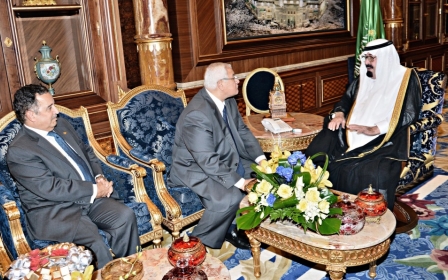Sisi pledges state intervention in Egypt's economy

Few believe that anyone other than Abdel Fatah al-Sisi will be President of Egypt after the country’s elections next week. But though the former field marshal can be confident of winning the presidency, the job itself will present many challenges, including rebuilding Egypt’s flagging economy.
The overthrow of Mohamed Morsi in 2013 led many to initally predict a return to confidence in the Egyptian economy.
As it stands, however, unemployment is at 13 percent, inflation is at 12 percent and Egypt’s tourism industry, previously a bedrock of the economy, has crashed in the wake of fears over violence and instability in the country.
Sisi has expressed the importance of "strengthening the role of the state which must monitor and remain engaged in the organisation and implementation of projects.”
The army is believed to control around a third of Egypt’s economy, owning many state-run industries, and analysts have suggested that the former military leader may wish to maintain similar economic policies while in government.
Stay informed with MEE's newsletters
Sign up to get the latest alerts, insights and analysis, starting with Turkey Unpacked
"He clearly sees a role for the army and state institutions in the economy which some businessmen consider as competition," said Mustapha Kamel al-Sayyid, professor of political science at Cairo University.
He told AFP that Sisi would seek to build support by expanding state-run services.
"For Mr Sisi, fighting poverty means depriving the Muslim Brotherhood of its popular support as it provides the poor with social services."
Sisi has also suggested that he may introduce a “mechanism” for controlling prices of some products to ensure the private sector “reduces its profit margins.”
It marks a change from a speech by Sisi in March where he called for austerity in the light of “very, very difficult” economic circumstances.
Last year, the IMF negotiated a $4.8bn loan with Egypt in return economic restructuring and market-friendly reforms.
Though the Gulf states have pledged enormous amounts of money to plug the gap in Egypt’s economy, spiralling inflation and a 13 percent budget deficit may force lawmakers to take tough decisions.
"The only way to cut the huge budget deficit is to end government subsidies on energy supplies to the private sector as it is industry's responsibility to bear the cost," said Sayyid.
30 percent of government spending goes on subsidies for bread and energy.
The interim government has already planned to reduce the budget deficit 5.6 percent by 2017, through reducing the subsidies and a proposal for a 5% tax levy on those with incomes over one million Egyptian pounds, policies also advocated by Sisi's main rival Hamdeen Sabahi.
More controversially, the interim government has also suggested a resumption of privatisation and the possible selling off of hundreds of hundreds of state-owned companies.
Sisi has expressed "confidence in the continuation of local and foreign investment and aid from Arab countries" to fund new projects that would help start a recovery.
As accusations have already come in from supporters of the ousted President Mohamed Morsi that “rigging” occurred during the Presidential ballot for expatriate Egyptians, observers suggest there may still be a long way to go for the next President to rebuild confidence in his country's economy.
Middle East Eye delivers independent and unrivalled coverage and analysis of the Middle East, North Africa and beyond. To learn more about republishing this content and the associated fees, please fill out this form. More about MEE can be found here.




